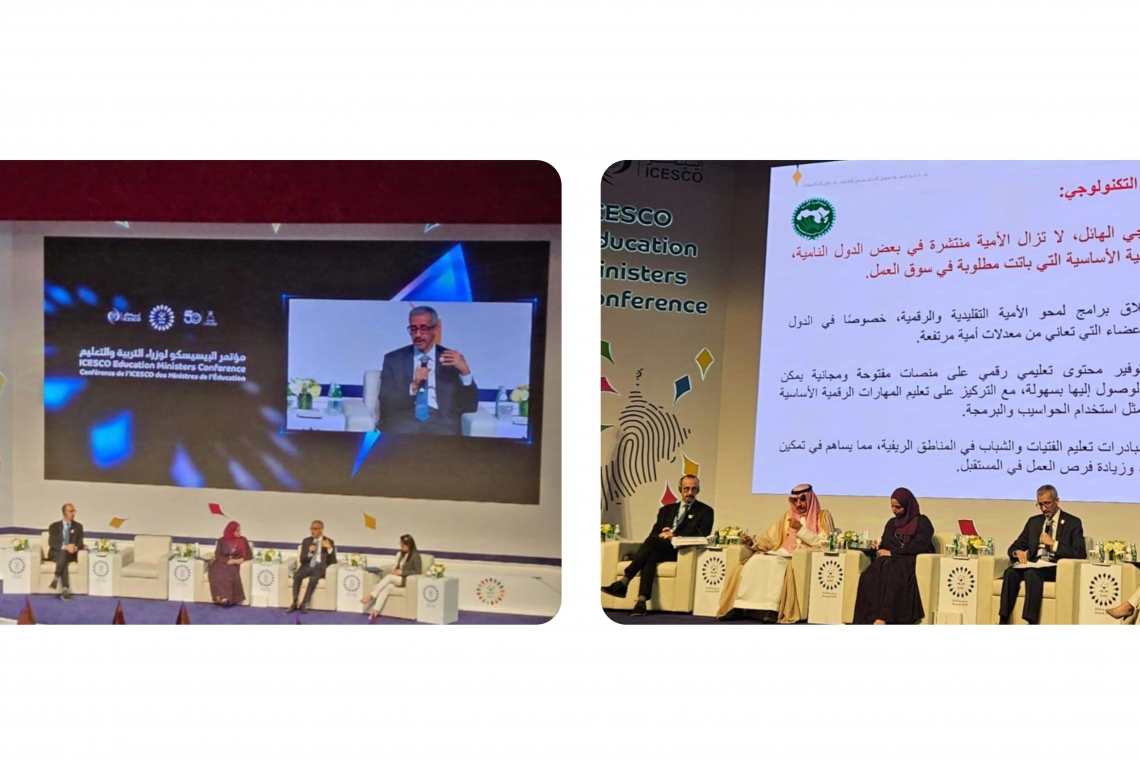At the kind invitation of the Islamic World Educational, Scientific and Cultural Organization (ICESCO) and the Ministry of Education in the Sultanate of Oman, H.E. Dr. Mohamed Ould Amar, Director-General of ALECSO, participated in the ICESCO Education Ministers Conference, held in Muscat, Oman, on October 2-3, 2024, under the theme of “Beyond Transforming Education Summit: rom Commitments to Actions”.
The Director-General took part in the First Session dedicated to Arab, regional, and international organizations, titled “Global Education Perspectives”. He began his remarks by expressing gratitude to His Majesty Sultan Haitham bin Tariq Al Said, Sultan of Oman, to H.E. Sheikh AbdulMalik bin Abdullah Al Khalili, Chairman of the State Council and Patron of the Conference, as well as to H.E. Dr. Madiha Ahmed Al-Shaibani, Omani Minister of Education. He also welcomed the ministers and heads of delegation participating in the Conference.
The Director-General highlighted ALECSO's program of action in the fields of education, culture, science, and ICT, in light of the current challenges facing education systems worldwide. He presented ALECSO's vision for the promotion of these fields, through a range of solutions in the following areas:
- Unequal access to quality education:
- Supporting open and free online education initiatives to ensure access for marginalized groups and remote areas;
- Collaborating with governments and the private sector to provide adequate technological infrastructure, including internet access and educational devices in schools and homes;
- Strengthening partnerships among international organizations to implement programs aimed at reducing the educational gap among countries and regions.
- Technological illiteracy
- Launching alphabetical and digital literacy programs, particularly in Member States with high illiteracy rates;
- Providing easily accessible digital educational content on open and free platforms, with focus on teaching essential digital skills such as computer use and programming;
- Supporting initiatives for educating girls and youth in rural areas, thereby contributing to women and youth empowerment and increasing job opportunities in the future.
- Shortage of qualified teachers
- Organizing continuous teacher training programs on the use of digital tools and modern educational technologies;
- Developing career guidance programs and exchanging expertise among member states to enhance teacher qualifications and professional capabilities;
- Establishing regional teacher training centers in collaboration with universities and international institutions.
- Digital transformation and adaptability challenges
- Promoting digital transformation by supporting educational innovation and adopting technology-based teaching methods, such as remote and hybrid learning;
- Developing multilingual digital educational platforms that provide open educational resources for all educational levels;
- Organizing international conferences and workshops on ways to leverage modern technology in education.
- Financial challenges in education
- Forging partnerships with global financial institutions and international organizations to provide sustainable funding for educational projects aimed at improving infrastructure and curricula;
- Assisting countries in developing sustainable educational policies that rely on private sector investment and community initiatives in education;
- Providing consultations to countries on how to improve educational resource management and to optimize the use of available budget resources.
- Education in times of crises and disasters
- Developing flexible educational solutions that respond to crises, such as creating remote learning platforms for use during emergencies;
- Supporting emergency education programs that provide temporary education in affected areas;
- Collaborating with relevant stakeholders to provide psychological and social support for students and teachers affected by crises.
- Environmental sustainability in education
- Supporting Education for Sustainable Development (ESD) initiatives that focus on enhancing environmental awareness and engaging with local communities to address environmental issues.
The Director-General stressed that ALECSO stands fully ready to pursue cooperation with strategic partners in pursuit of shared goals, through ongoing consultation and purposeful thinking aimed at shaping the future of education, culture, and science in response to international developments.
The Director-General was accompanied to the Conference by Dr. Rami Iskander, Director of Education, and Dr. Mohamed Jemni, Director of ICT.



